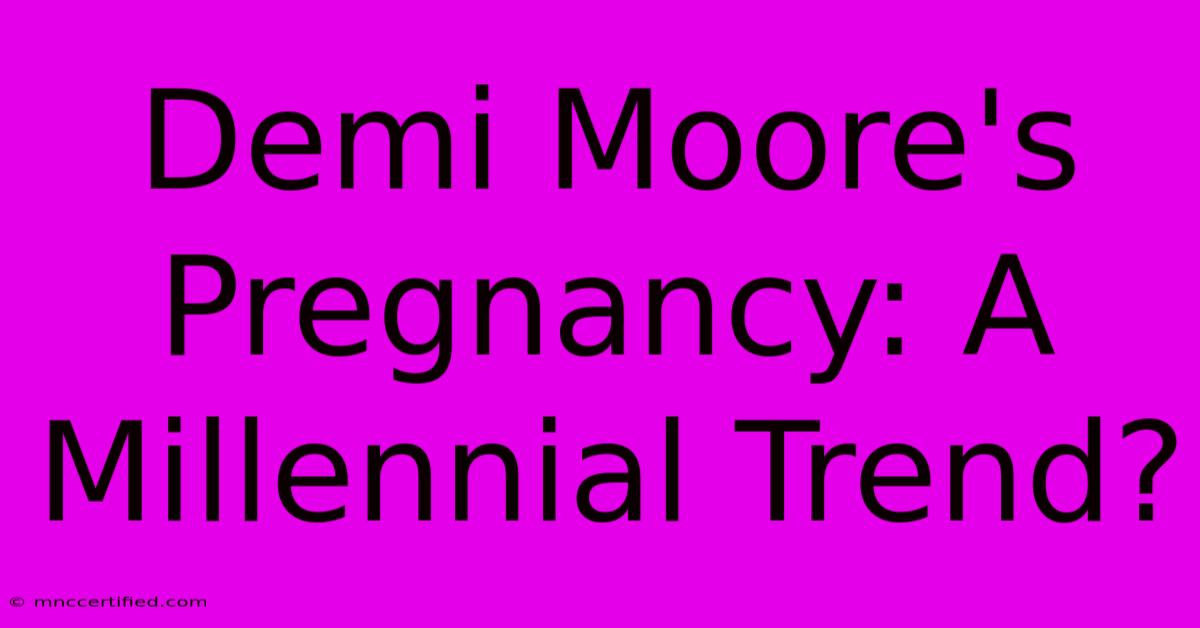Demi Moore's Pregnancy: A Millennial Trend?

Table of Contents
Demi Moore's Pregnancy: A Millennial Trend? Rethinking Age and Motherhood in the 21st Century
Demi Moore's pregnancy with Rumer Willis in 1987, while not exactly a recent event, continues to spark conversation, particularly in the context of modern reproductive technologies and shifting societal attitudes toward motherhood. While not a trend in the strictest sense, her experience highlights evolving perspectives on age and pregnancy, particularly relevant to millennials and Gen Z. This article explores the complexities of Moore's pregnancy and its resonance with current discussions surrounding maternal age.
The Context of Demi Moore's Pregnancy
Moore's pregnancy at the height of her career, coupled with her relatively young age (25 at the time), presented a different picture than many contemporary narratives of motherhood. While not uncommon, it certainly wasn't the widespread norm to have a child at that age and at the peak of a Hollywood career. This unique circumstance contributes to the ongoing relevance of her story.
Challenging Traditional Norms
In the 1980s, societal expectations surrounding pregnancy and motherhood were often more rigid. The ideal age to have children was generally considered earlier, and a successful career woman might face societal pressure to choose between career ambition and family life. Moore, through her high-profile pregnancy, implicitly challenged these norms. She demonstrated the possibility of navigating both motherhood and a demanding career simultaneously.
The Millennial and Gen Z Perspective
Today, millennials and Gen Z are inheriting a drastically different landscape. Access to information, reproductive technologies, and greater career flexibility offer more choices than ever before. However, these choices also bring new pressures and anxieties.
Delayed Motherhood: A Conscious Choice?
Many millennials and Gen Z individuals are choosing to delay motherhood for various reasons, including career aspirations, financial stability, and a desire for personal fulfillment. This contrasts with previous generations where childbearing often occurred earlier in life. While delaying motherhood may be a conscious choice, it also brings about increased anxieties surrounding fertility and biological clocks.
Societal Expectations and Pressure
Despite societal shifts, there remains pressure to conform to certain timelines regarding motherhood. Individuals facing challenges with conception or those choosing not to have children may experience societal judgment and unwarranted scrutiny. This pressure is exacerbated by the constant stream of idealized family portrayals in media.
The Role of Social Media
Social media platforms further complicate the narrative. While offering support networks and communities for those navigating parenthood, they also contribute to the idealized depictions of motherhood, often creating unrealistic expectations and anxieties. The curated images and narratives presented can lead to feelings of inadequacy and pressure to conform.
Demi Moore's Legacy: A Shifting Paradigm
Demi Moore's pregnancy, viewed through a millennial lens, acts as a potent symbol of the evolving relationship between career, motherhood, and personal choice. While her experience is not directly replicable, it continues to resonate with discussions regarding age, reproductive health, and the complexities of balancing career and family.
Embracing the Complexity
The narrative surrounding Demi Moore’s pregnancy emphasizes the multifaceted nature of motherhood in the 21st century. It highlights the shifting perspectives on age, career, and family planning, urging us to embrace the complexity and individuality of each woman's journey.
Conclusion: More Than a Trend
Demi Moore's pregnancy is not simply a trend; it’s a historical marker reflecting a broader societal shift. Her experience, analyzed through the lens of millennial and Gen Z perspectives, encourages open conversations about age, motherhood, and the diverse pathways to fulfilling lives. It’s a reminder that there is no single “right” way to navigate these pivotal life choices. The ongoing discussion surrounding her pregnancy serves as a powerful catalyst for a more nuanced and supportive understanding of modern motherhood.

Thank you for visiting our website wich cover about Demi Moore's Pregnancy: A Millennial Trend?. We hope the information provided has been useful to you. Feel free to contact us if you have any questions or need further assistance. See you next time and dont miss to bookmark.
Featured Posts
-
Poland 1 2 Scotland Nations League Recap
Nov 19, 2024
-
Daikin Park Astros Home Through 2039
Nov 19, 2024
-
Empire Dental Insurance Providers
Nov 19, 2024
-
Trump Dance Nfl Players Celebrate
Nov 19, 2024
-
Demi Moores Pregnancy A Millennial Trend
Nov 19, 2024